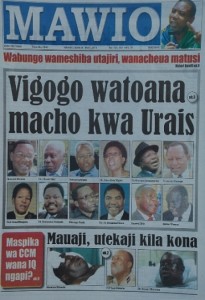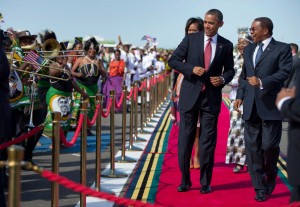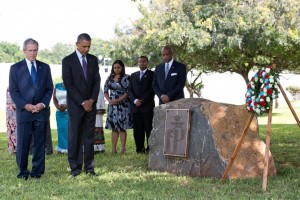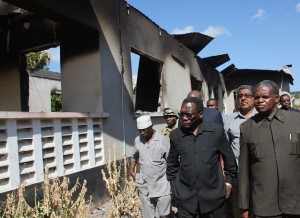by Ben Taylor
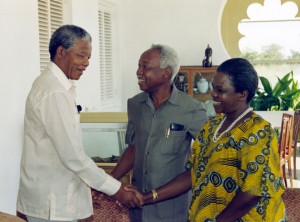
Nelson Mandela with President Nyerere and Mama Maria Nyerere during his visit to Tanzania after his release in 1990 (source http://ancarchives.org.za)
The death of Nelson Rolihlahla Mandela has drawn tributes from the great and the good (and the not so great or good) around the world. Presidents Barack Obama and Jacob Zuma understandably drew the most attention.
Tanzania’s President Kikwete and Mama Maria Nyerere, the widow of Julius Nyerere, attended the funeral service in the village of Qunu. They were both very warmly received. President Kikwete paid tribute to Mandela, taking the opportunity to remind those in attendance, and the watching world, of Tanzania’s role in the anti-apartheid struggle and of the time Mandela spent in Tanzania. In the process, he brought Thabo Mbeki, Mandela’s successor as South African President, to tears. The following is an extract from President Kikwete’s tribute:
“The people of Tanzania would like you to know that you are not alone. They are with you during this difficult period and mourning. They are saying your grief is our grief, your loss is our loss. Nelson Mandela was our leader, our hero, our icon and our father as much as he was yours. The people of Tanzania have lost a great friend and great comrade in arms.
“President Mandela had long standing association with Tanzania. It dates back to the times of the struggle for independence and liberation here in South Africa and in Tanzania. We supported each other at the time of need. It was no accident, therefore, that after the ANC decided to establish the armed wing, the Umkotho we Sizwe, after peaceful means seemed to be futile, Dar es Salaam was Madiba’s first port of call in 1962. He left South Africa secretly and came to newly independent Tanganyika to seek support for the armed struggle and a place to train the MK combatants.
“Though at first President Nyerere had some reservations about when and how to initiate the armed struggle, he accepted Madibas’ request and provided members of the MK both permission to live in Tanzania and places to train. I am sure to the ANC and MK veterans gathered here, names like Kongwa, Mgagao, Morogoro, Mazimbu and Dakawa sound familiar. They may even rekindle nostalgic memories of the life they lived in Tanzania.
“Besides that, Tanzania was generous enough to give cadres of the liberation movements travel documents – passports and all that is needed. Where necessary, they assumed Tanzanian names. When Madiba came to Tanzania he had no passport. He was given a Tanzanian travel document. It facilitated his movement. And I know a number of you used Tanzanian travel documents – I don’t know if Thabo returned his?
“There is another interesting thing about Madibas’ first visit to Tanzania in 1962 which I would like to mention. In order to keep the visit discreet, he did not stay in hotels; he stayed at the home of TANU’s Treasurer who was then the Minister for Commerce and Industries Mr Nsilo Swai. On his departure to his onward trip to Accra, Lagos, Addis and Algiers, he left his boots at Mr Swai’s home in the hope that on his way back he would pick up the boots. Unfortunately, he did not pass through Dar es Salaam and shortly after arriving back in South Africa, Mandela was arrested and imprisoned and spent the 27 years in Robben Island.
“Fortunately, the Swai family kept the boots awaiting his return. In 1995 when Madiba was President of the new South Africa, the pair of brown boots was handed back to him by Mrs Vicky Nsilo Swai the widow of the late Nsilo Swai who died in 1994.
“I have narrated these stories and anecdotes to let people know how far back, the present excellent relations between our two friendly countries and both the ANC and Chama cha Mapinduzi have come from. It is not by accident that South Africa and Tanzania enjoy excellent bilateral relations. We are close friends and allies because our common history unites us.
“Comrades, it is none other than our founding father, first President Mwalimu Julius Nyerere, and the first President of the new South Africa, Nelson Mandela who are responsible for this. They built very strong foundations for our bilateral relations. Madiba is very much our leader, our hero, our icon and our father as he is to you. That is why your sadness, grief and sorrow are ours as well. That is why we also join you in celebrating the life of this great man.”
see TA Issue 36 for details of Mandela’s visit to Tanzania in 1990

